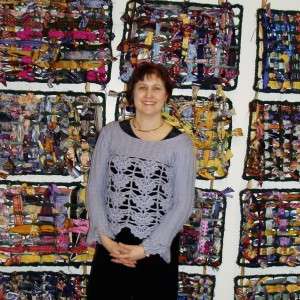Study discovers power of art making on mood

For people who work with textiles to create art, whether it's knitting, quilt making or needlework, it is likely no surprise that the activities aid in relaxation and improve mood. Ann Collier, assistant processor of psychological sciences, has first-hand experience with the phenomenon and the research to explain it.
After having three children in about a year, Collier turned to making textiles as a means of coping. "It was the only relief I had, the only part of my life where I could finish something beautiful and have control," Collier said.
As an academic psychologist, she began questioning the therapeutic value of making art and decided to write a book. "At the time, there was very little research on the topic," said Collier, who set out to fill the gaps. Her papers have been published in the Journal of Psychology of Aesthetics, Creativity and the Arts and the American Art Therapy Journal.
Because people, especially women, have been making textile arts for centuries, and because the activities improve moods, Collier wanted to explore how art making could become even more useful by being used in therapy.
In addition to survey studies, Collier recently conducted a laboratory study of women ages 18 to 77 who had some expertise in making textiles. Participants were asked to share in detail a stressful event and then they were assigned to control groups: expressive writing, meditation or art making. The women evaluated their moods and provided saliva samples to measure the body's inflammatory immune responses before, during and after the experiment.
Participants in the art-making group had the most positive outcomes in mood repair and inflammatory immune responses. "It validates what I thought which is, you're so engrossed in what you are doing, you can't remember what bothered you and then you feel refreshed when you go back to the rest of your life," Collier said.
Her additional research includes understanding how her findings correspond with the psychology of flow, described as the mental state of energized focus and being completely absorbed with an activity.
Collier also is collaborating with a peer at another institution to include men who engage in do-it-yourself activities in her research and has plans to expand her work to include greater economic and cultural diversity among participants.
Provided by Northern Arizona University


















